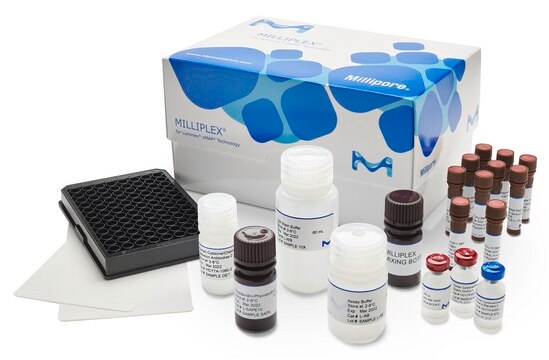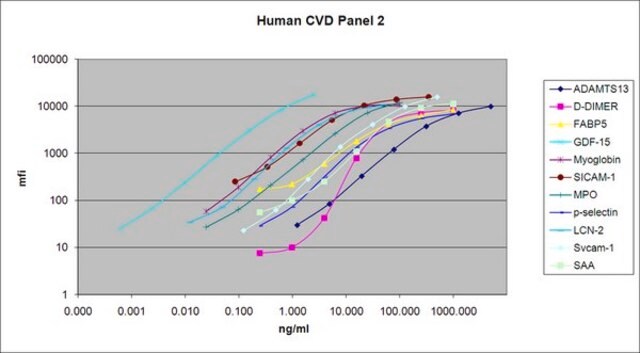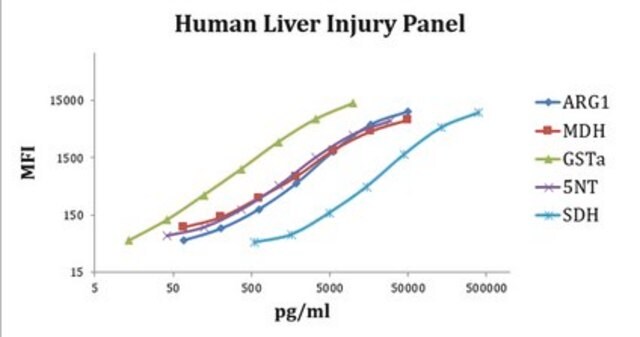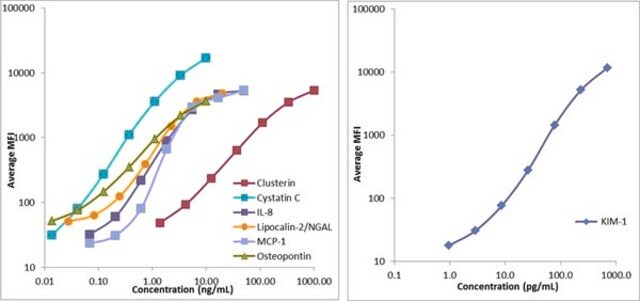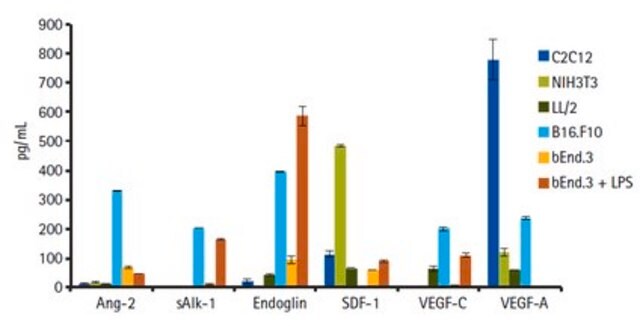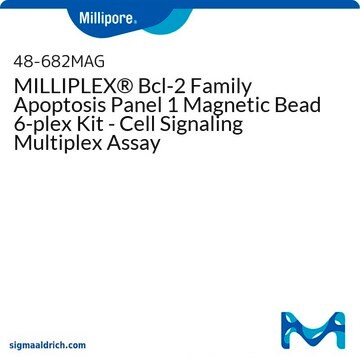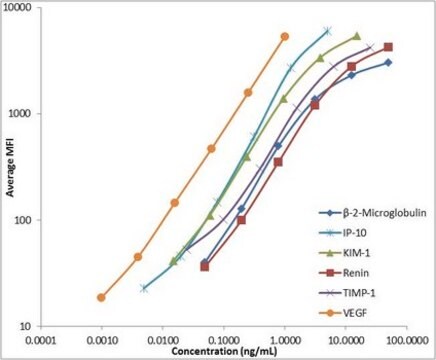HKI6MAG-99K
MILLIPLEX® Human Kidney Injury Magnetic Bead Panel 6 - Toxicity Multiplex Assay
The analytes available for this multiplex kit are: β-2-Microglobulin (β2M), Clusterin, Cystatin C, RBP4.
About This Item
Produits recommandés
Niveau de qualité
Espèces réactives
human
Fabricant/nom de marque
Milliplex®
assay range
accuracy: 103-133%
intra-assay cv: <10
sensitivity: 0.10-3.42 ng/mL
(MinDC+2SD)
standard curve range: 0.05-50 ng/mL
(β-2-Microglobulin (β2M))
standard curve range: 0.10-100 ng/mL
(RBP4)
standard curve range: 0.59-600 ng/mL
(Cystatin C)
standard curve range: 2.93-3,000 ng/mL
(Clusterin)
Technique(s)
multiplexing: suitable
Méthode de détection
fluorometric (Luminex xMAP)
Conditions d'expédition
wet ice
Description générale
The MILLIPLEX® portfolio provides valuable research assays to investigate multiple biomarkers of kidney injury in human serum and plasma samples using the [Luminex® xMAP® instrument platform.
The MILLIPLEX® Human Kidney Injury Bead Panel 6 contains all the components necessary to measure the following four biomarkers in any combination using [Luminex® xMAP® technology: β-2-Microglobulin (β2M), Clusterin, Cystatin C, RBP4. The kit uses a 96-well format, contains a lyophilized standard cocktail, two quality controls and can measure up to 38 serum or plasma samples in duplicate.
Panel Type: Toxicity
Spécificité
There was no or negligible cross-reactivity between the antibodies for an analyte and any of the other analytes within a panel.
Application
- Analytes: β-2-Microglobulin (β2M), Clusterin, Cystatin C, RBP4
- Recommended Sample type: serum and plasma
- Recommended Sample dilution: 1:3,000 in kit Assay Buffer. Customers should determine the optimal dilution factor for their samples. Our recommendations are based on serum and plasma samples from normal subjects.
- Assay Run Time: Overnight
- Research Category: Toxicity
Caractéristiques et avantages
Conditionnement
Stockage et stabilité
Autres remarques
Informations légales
Clause de non-responsabilité
Mention d'avertissement
Danger
Mentions de danger
Classification des risques
Acute Tox. 3 Dermal - Acute Tox. 4 Inhalation - Acute Tox. 4 Oral - Aquatic Chronic 2 - Eye Dam. 1 - Skin Sens. 1 - STOT RE 2
Organes cibles
Respiratory Tract
Code de la classe de stockage
6.1C - Combustible acute toxic Cat.3 / toxic compounds or compounds which causing chronic effects
Certificats d'analyse (COA)
Recherchez un Certificats d'analyse (COA) en saisissant le numéro de lot du produit. Les numéros de lot figurent sur l'étiquette du produit après les mots "Lot" ou "Batch".
Déjà en possession de ce produit ?
Retrouvez la documentation relative aux produits que vous avez récemment achetés dans la Bibliothèque de documents.
Contenu apparenté
Novel kidney toxicity biomarkers expand options for acute nephrotoxicity detection. Multiplex assays measure multiple renal damage biomarkers in small sample volumes, minimizing time and costs. See how MILLIPLEX® multiplex kidney toxicity assays detected vancomycin-induced subacute nephrotoxicity in rat models.
Exploring genotoxicity and DNA damage through multiplexing with MILLIPLEX® multiplex genotoxicity assays using Luminex® xMAP® technology enables the high-throughput measurement of phosphorylation levels of multiple proteins simultaneously and reduces sample volume, time, and cost.
Multiplex toxicity assays enable researchers to simultaneously measure multiple toxicity biomarkers of various organs to gain a better understanding of toxicity. Explore how MILLIPLEX® multiplex toxicity assays are advancing research on liver injury, kidney toxicity, genotoxicity, and more.
Notre équipe de scientifiques dispose d'une expérience dans tous les secteurs de la recherche, notamment en sciences de la vie, science des matériaux, synthèse chimique, chromatographie, analyse et dans de nombreux autres domaines..
Contacter notre Service technique